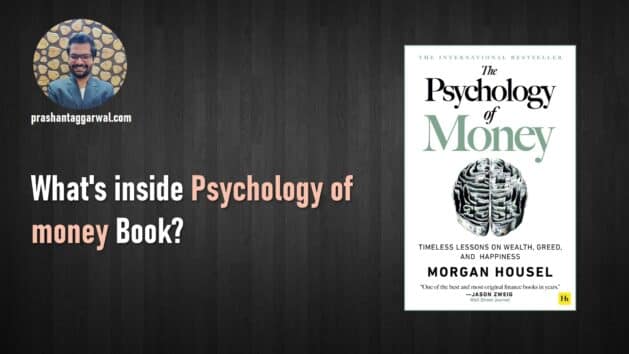Psychology of Money by Morgan Housel

Psychology of Money by Morgan Housel is an excellent book for college students who are already thinking about going into business for themselves. For those who are just beginning their journey in business, this is a must-read. This book will serve as both a reference guide and a core learning tool. By the time students graduate and begin attending business school, they will have gained valuable information from this book.
Introduction
This book begins with an introduction to the author and his background in business. An aside in the preface mentions that Morgan Housel’s interests include alternative investments, micro-cap stocks, short-term investing, and long-term investing. Accompanying pictures of real estate, planes, cars, and other items are shown throughout the book. An entire chapter is devoted to discussing the concepts of value investing. Value investing is an investment strategy focused on maximizing the current worth of a company rather than its stock price.
Strategy
The advice in this book is to invest in a company that has long-term potential. A good investor should take advantage of stocks with compounding returns. A good compounding calculator is recommended to determine a good investment return rate. After this, the author provides guidance on how to use charts and graphs to monitor company performance. There are charts with specific sections designated to display different aspects of profits, loss, balance sheet, etc. These sections are very helpful to use.
Investments
The advice in this book on compounding returns is to diversify one’s portfolio. An individual’s age, investment experience, geographic location, net worth, annual salary, and savings rate all play a part in creating a portfolio that will allow for good returns. The author provides specific investment options to include with each mix of fixed income and equity. This book also discusses the role that government programs such as the EFT and Fannie Mae play in creating the wealth factor for investors.
Risk
The author discusses the risks involved in investing. The author cautions against taking on too much risk. Specifically, the author cautions against taking on a large amount of credit risk by issuing too many stocks or issuing too many debt obligations at once. The author cautions against investing in oil futures and oil stocks. He explains that most investors need to wait for six months or more before making a decision on these types of investments.
The author gives very good advice about how to manage risk. Specifically, he teaches that stock market investing only produces two types of returns, high and low. High returns are earned by investors through compounding, while low returns are earned through volatility and tail events. The strategies that the author lays out in her book can help you build a wealthy investing future.
Money Management
This book discusses the importance of money management. The author explains how investing in the stock market works. In fact, the author shows you how to use the concept of compounding return to your advantage. By managing your money properly you can increase your wealth over time. Staying wealthy is about managing your money and being disciplined with your investments.
The author closes out the book by providing a couple of “do not follow” recommendations. Specifically, he warns that you should stay away from certain stock market products, such as options and warrants, and that you should avoid stocking programs that promise to automatically make money for you. Neither of these recommendations is especially noteworthy. In fact, it is unlikely that either of them will hurt your bottom line.
Bottom Line
This book provides excellent information on building wealth through compounding. It’s an excellent primer and has lots of practical tips and advice. The book also ties it together with a personal story of her own success. The book ends by reminding you that your job is the most important aspect of wealth building. Following her lead, I would recommend this book to any person who is just getting started with investing and wants a solid foundation of financial knowledge.
For the individual who has not had much experience with investing, or who is new to the stock market, this book provides a solid foundation of financial education. The author also provides a good overview of compound interest and how to use it to become wealthy. For this book, I would highly recommend it. For the investor interested in becoming wealthy, however, I would recommend other books by the author.
If you found my post helpful, then do share it with your friends and colleagues. If you have any feedback/questions, you may leave a comment below.
Click here to know more about me.

